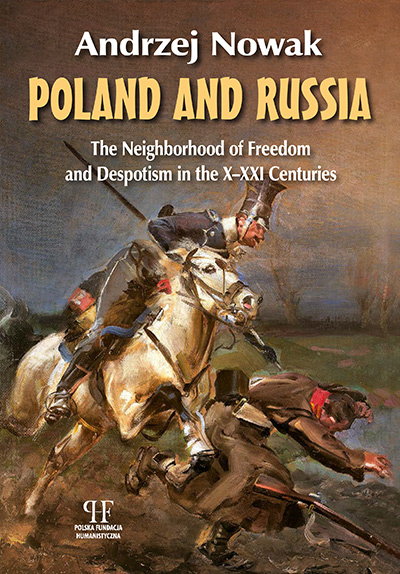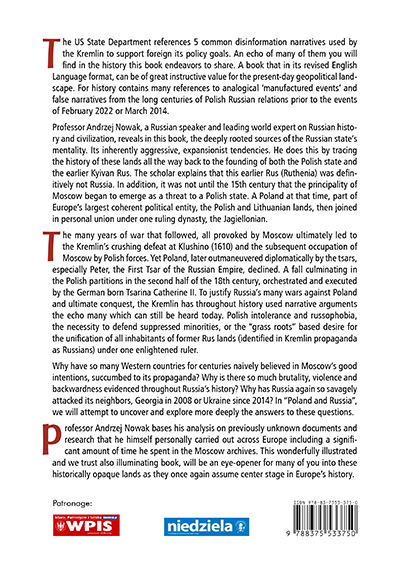Poland and Russia
The US State Department references 5 common disinformation narratives used by the Kremlin to support foreign its policy goals. An echo of many of them you will find in the history this book endeavors to share. A book that in its revised English Language format, can be of great instructive value for the present-day geopolitical landscape. For history contains many references to analogical ‘manufactured events’ and false narratives from the long centuries of Polish Russian relations prior to the events of February 2022 or March 2014.
Professor Andrzej Nowak, a Russian speaker and leading world expert on Russian history and civilization, reveals in this book, the deeply rooted sources of the Russian state’s mentality. Its inherently aggressive, expansionist tendencies. He does this by tracing the history of these lands all the way back to the founding of both the Polish state and the earlier Kyivan Rus. The scholar explains that this earlier Rus (Ruthenia) was definitively not Russia. In addition, it was not until the 15th century that the principality of Moscow began to emerge as a threat to a Polish state. A Poland at that time, part of Europe’s largest coherent political entity, the Polish and Lithuanian lands, then joined in personal union under one ruling dynasty, the Jagiellonian.
The many years of war that followed, all provoked by Moscow ultimately led to the Kremlin’s crushing defeat at Klushino (1610) and the subsequent occupation of Moscow by Polish forces. Yet Poland, later outmaneuvered diplomatically by the tsars, especially Peter, the First Tsar of the Russian Empire, declined. A fall culminating in the Polish partitions in the second half of the 18th century, orchestrated and executed by the German born Tsarina Catherine II. To justify Russia’s many wars against Poland and ultimate conquest, the Kremlin has throughout history used narrative arguments the echo many which can still be heard today. Polish intolerance and russophobia, the necessity to defend suppressed minorities, or the “grass roots” based desire for the unification of all inhabitants of former Rus lands (identified in Kremlin propaganda as Russians) under one enlightened ruler.
Why have so many Western countries for centuries naively believed in Moscow’s good intentions, succumbed to its propaganda? Why is there so much brutality, violence and backwardness evidenced throughout Russia’s history? Why has Russia again so savagely attacked its neighbors, Georgia in 2008 or Ukraine since 2014? In “Poland and Russia”, we will attempt to uncover and explore more deeply the answers to these questions.
Professor Andrzej Nowak bases his analysis on previously unknown documents and research that he himself personally carried out across Europe including a significant amount of time he spent in the Moscow archives. This wonderfully illustrated and we trust also illuminating book, together with Professor Nowak’s upcoming book on Ukraine, will be an eye-opener for many of you into these historically opaque lands as they once again assume center stage in Europe’s history.

